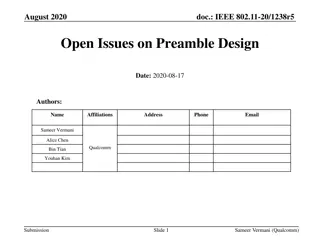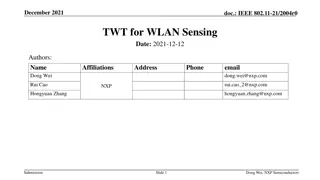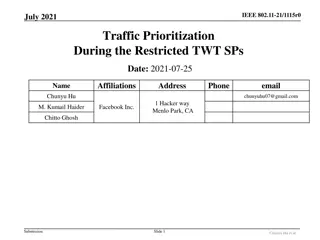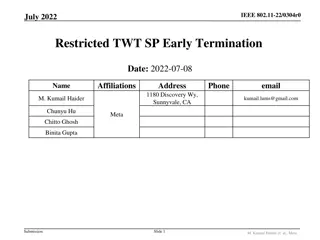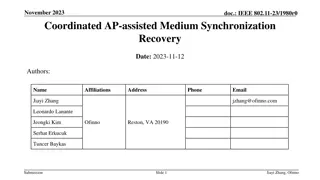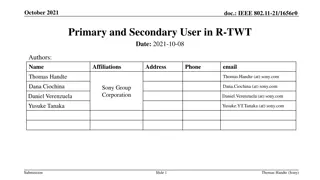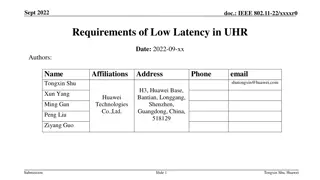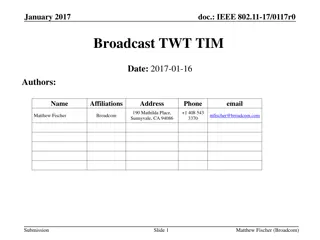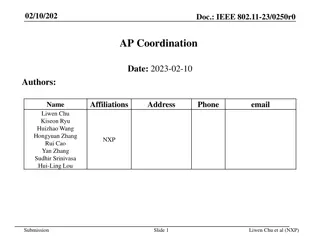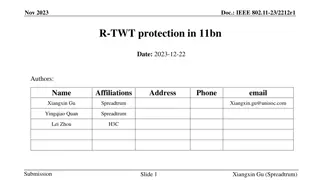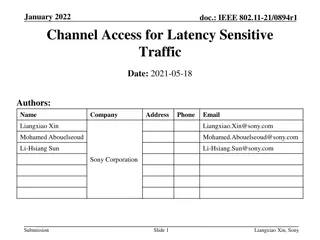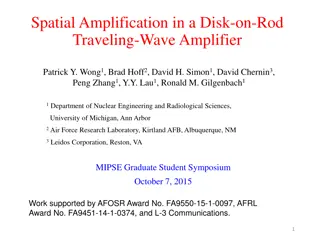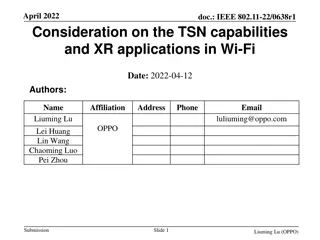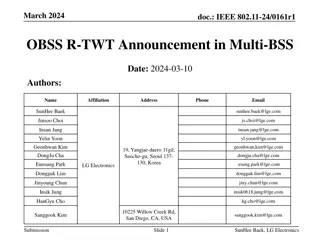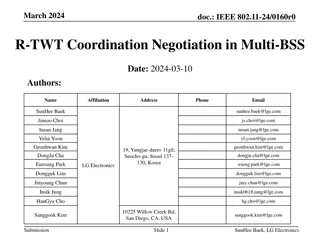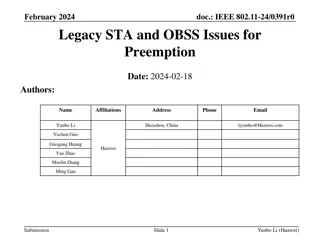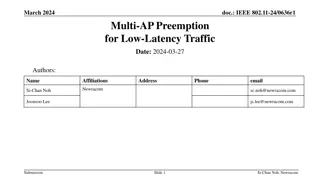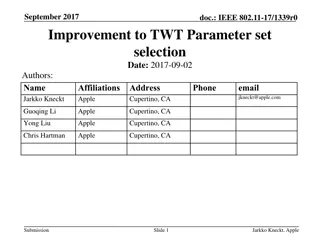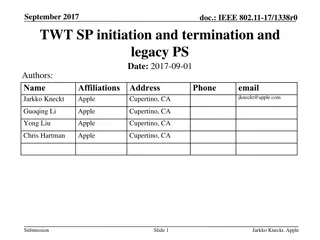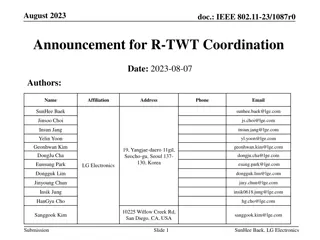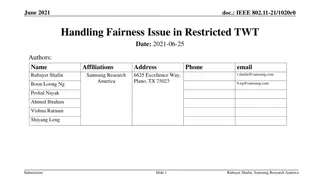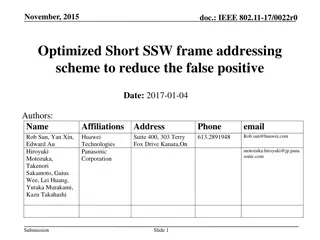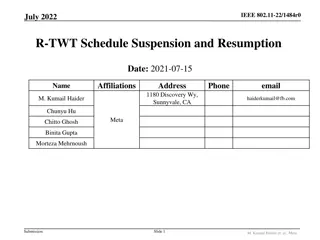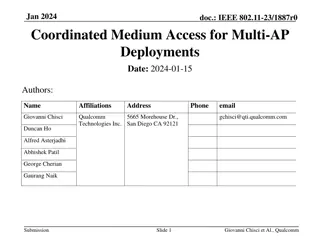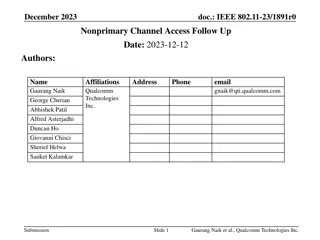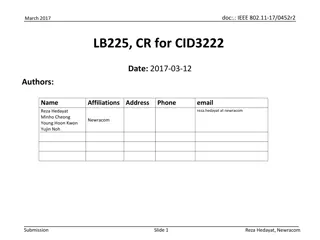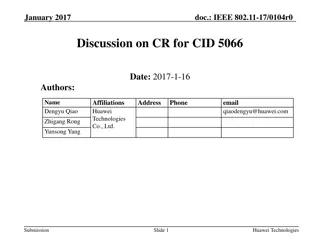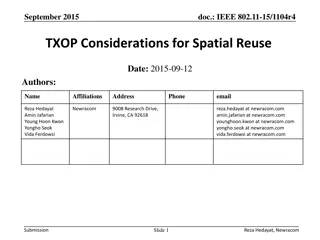Coordinated R-TWT Protection in Multi-BSS
The protection of Restricted Transmitting Using Time Window (R-TWT) service periods in a multi-BSS environment, where overlapping BSSs can affect the latency-sensitive traffic exchange. It proposes methods to coordinate R-TWT service periods and receive schedule information for neighboring BSSs.
3 views • 11 slides
Enhancing In-Device Coexistence and P2P Communication in IEEE 802.11-23/2002r0
This document discusses proposals to improve reliability in the presence of interference or other device activities within the IEEE 802.11-23/2002r0 standard. Solutions include long-term indications for periodic service periods, interference indication in the frequency domain, expected behaviors, an
6 views • 25 slides
Enhancing R-TWT with Multi-AP Coordination in IEEE 802.11 Networks
Delve into the world of IEEE 802.11 wireless networks as this document explores solutions for multi-AP coordination for R-TWT, focusing on improving tail latency, jitter, and medium protection. Enhancements in R-TWT operation, coordination scenarios, and solutions for multi-AP deployments are discus
1 views • 12 slides
IEEE 802.11-20/1238r5 August 2020 Preamble Design Open Issues
In these slides, designs for U-SIG content & overflow and EHT-SIG design are proposed. The focus is on punctured channel indication design with the aim of conveying puncturing patterns efficiently while keeping signaling overhead low. The proposal includes a 6-bit field for puncturing information, a
1 views • 41 slides
IEEE 802.11-21/2004r0 Target Wake Time (TWT) for WLAN Sensing
This technical document delves into the implementation of Target Wake Time (TWT) in wireless local area networks (WLAN) for efficient power management in sensing devices. It explores the significance of TWT in minimizing contention among stations, reducing power consumption, and optimizing wake sche
0 views • 14 slides
IEEE 802.11-21/1115r0 Traffic Prioritization Summary
The presentation discusses traffic prioritization rules during restricted TWT SPs in IEEE 802.11-21/1115r0. It revisits the topic to address pending items related to traffic restriction or prioritization, including specific rules for APs, scheduled STAs, supporting non-AP STAs, and non-rTWT STAs. Co
1 views • 14 slides
Enhancements for TWT SP Early Termination in IEEE 802.11-22/0304r0
In the IEEE 802.11-22/0304r0 document, enhancements are proposed for supporting latency-sensitive traffic by introducing additional improvements to the TWT SP early termination feature. These enhancements aim to facilitate efficient termination of the restricted TWT SP, allowing STAs to enter the do
0 views • 17 slides
Coordinated AP-Assisted Medium Synchronization Recovery in IEEE 802.11-23/1980r0
This document discusses the proposal for medium synchronization recovery leveraging multi-AP coordination for multi-link devices in IEEE 802.11be EHT networks. It introduces the concept of AP-assisted medium synchronization recovery to assist non-AP STAs in transmitting frames without causing collis
0 views • 7 slides
IEEE 802.11-21/1656r0: Primary and Secondary User in R-TWT
In October 2021, the document IEEE 802.11-21/1656r0 discusses the usage of R-TWT for low-latency services in 11be TGbe networks. It addresses the coexistence with legacy STAs, transmission delays, and the design challenges related to R-TWT service periods. Various related submissions and CIDs are hi
0 views • 15 slides
Low Latency Requirements in Ultra-High Rate Communication
This document discusses the requirements and use cases of low latency in ultra-high rate communication scenarios, highlighting applications such as metaverse, cloud gaming, real-time video streaming, in-vehicle infotainment, and industrial PLC control. It also covers current methods to reduce latenc
1 views • 12 slides
Enhancing 802.11 Scheduling with Broadcast TWT and TIM Mechanisms
The January 2017 document IEEE 802.11-17/0117r0 discusses the implementation of coordinated multi-user downlink and triggered multi-user uplink in 802.11 systems to improve scheduling and reduce collisions. It proposes aligning power saving wake times using Target Wake Time (TWT) for better efficien
1 views • 17 slides
Enhanced AP Coordination in IEEE 802.11 Networks
The document discusses the implementation of Restricted Transmit Wait Time (R-TWT) scheduling in IEEE 802.11 networks. It covers topics such as AP coordination, announcement of R-TWT schedules by APs, usage of 1-hop and 2-hop neighbor information for scheduling, and STA's notification of neighbor AP
0 views • 7 slides
Proposal for R-TWT Protection in IEEE 802.11-23/2212r1 11bn
A detailed discussion on considerations and proposals for R-TWT Signal Protection in 11bn networks is provided in this document. It covers topics like protection between neighboring APs, different OBSS R-TWT SPs for STAs, proposals for APs and STAs in a BSS, concluding with the importance of conside
0 views • 6 slides
Enhancing Channel Access for Latency-Sensitive Traffic in January 2022
In the documentation IEEE 802.11-21/0894r1, the focus is on improving channel access for latency-sensitive traffic through concepts like Restricted TWT (Target Wake Time). The proposal suggests methods to protect TWT Service Periods from non-TWT scheduled STAs, ensuring prioritized transmission of l
0 views • 11 slides
Determining OBS Clock Drift Using Seismic Interferometry
Determining clock errors in Ocean Bottom Seismometers (OBSs) is crucial for accurate seismic data recording. This study presents a method using ambient seismic noise and seismic interferometry to correct clock drift in OBSs. The program developed employs Python/Fortran to analyze seismic data direct
0 views • 10 slides
Spatial Amplification in Disk-on-Rod Traveling-Wave Amplifier Study
Explore the viability of Disk-on-Rod Traveling Wave Tube (TWT) for high-power microwave devices with wide bandwidth. Analyze the spatial amplification rate through hot-tube dispersion relations, comparing against Particle-in-Cell code simulations. Schematic diagrams and cold-tube dispersion relation
0 views • 13 slides
Consideration on TSN Capabilities and XR Applications in Wi-Fi
This contribution evaluates XR applications in Wi-Fi, focusing on high throughput, low latency, and reliability. It discusses in-car XR entertainment/navigation as an entry-level TSN application and proposes integrating Wi-Fi technologies like 11be for improved performance. The document highlights t
0 views • 17 slides
IEEE 802.11-24/0161r1 OBSS R-TWT Announcement in Multi-BSS
The document discusses the coordination of R-TWT schedules in Multi-BSS to enhance operation and protection. It covers how APs announce OBSS R-TWT schedules to associated STAs, ensuring efficient transmission of latency-sensitive traffic. Methods for announcing OBSS R-TWT schedules to EHT STAs and U
0 views • 13 slides
R-TWT Coordination Negotiation in Multi-BSS Networks
This document discusses the coordination negotiation process for R-TWT schedules in Multi-BSS networks to minimize interference between Access Points (APs). It outlines the overview, signaling methods, and importance of coordinated R-TWT schedules in improving network efficiency.
0 views • 16 slides
Legacy STA and OBSS Preemption Considerations in IEEE 802.11-24
Discussions in IEEE 802.11-24 address preemption issues related to UHR STAs within a single BSS, focusing on legacy STA impact and OBSS considerations. Proposed solutions aim to balance efficiency and latency by adjusting TXOP limits for different STA types.
0 views • 7 slides
Multi-AP Preemption for Low-Latency Traffic in IEEE 802.11 Networks
Discussion on the necessity of Multi-AP preemption for low-latency traffic in IEEE 802.11 networks. Addresses issues related to latency-sensitive traffic in overlapping basic service sets (OBSS). Proposes a general solution to enable OBSS APs to transmit urgent low-latency traffic without significan
0 views • 9 slides
Enhancement of TWT Parameter Set Selection in September 2017
Submission in September 2017 proposes improvements in TWT parameter selection for IEEE 802.11 networks. It allows TWT requesting STAs to signal repeat times, enhancing transmission reliability and reducing overheads. Non-AP STA challenges and current TWT setup signaling are addressed, providing a me
0 views • 12 slides
IEEE 802.11-17/1338r0 - September 2017 TWT SP Initiation and Termination
This document, authored by Jarkko Kneckt from Apple, discusses the September 2017 TWT SP initiation and termination processes, focusing on high throughput and power efficiency for 802.11ax devices. Legacy power save mechanisms in parallel with TWT mechanisms are explored, along with issues related t
0 views • 15 slides
Announcement of OBSS R-TWT Coordination in Multi-BSS Environment
The document discusses the coordination of R-TWT service periods (SPs) in a Multi-BSS environment, focusing on addressing limitations in the exchange of latency-sensitive traffic in adjacent BSSs. It explores methods for coordinating R-TWT SPs among multiple APs to protect the intended SPs within ea
0 views • 9 slides
Handling Fairness Issue in Restricted TWT Operation
Proposal addressing fairness vs. channel utilization tradeoff in restricted Target Wake Time (TWT) operation for IEEE 802.11 networks. Solution suggested for underutilization of TWT schedules due to early completion of latency-sensitive transmissions, mitigating fairness concerns while optimizing ch
0 views • 14 slides
Optimized Short SSW Frame Addressing Scheme to Reduce False Positive Rate
Proposal discusses optimizing the addressing scheme in Short SSW frames for IEEE 802.11 to reduce false positives, introducing a 16-bit dual partial AIDs approach and calculating false positive rates based on hashed addresses and AIDs. The method aims to enhance efficiency and decrease collision pro
0 views • 19 slides
IEEE 802.11-22/1484r0 - R-TWT Schedule Suspension and Resumption
For supporting latency-sensitive traffic, the IEEE 802.11-22/1484r0 standard discusses the suspension and resumption of R-TWT schedules. It explores existing signaling for TWT suspension/resumption in R-TWT operation, identifies gaps, and proposes enhancements. The document addresses TWT Information
0 views • 12 slides
Coordinated Medium Access for Multi-AP Deployments in IEEE 802.11 Networks
The document discusses a solution to reduce latency, increase throughput, and improve reliability in networks with latency-sensitive traffic by introducing coordination between access points (APs). This involves leveraging mechanisms like Restricted TWT (rTWT) and Coordinated rTWT (C-rTWT) to facili
0 views • 12 slides
Enhancing Spectral Efficiency Through Nonprimary Channel Access in IEEE 802.11
IEEE 802.11 is exploring nonprimary channel access to address underutilization of spectrum and improve latency and throughput. This approach involves enabling nonprimary channel access with simple modifications to existing rules, such as limiting TXOP duration and using control frames for coordinati
0 views • 13 slides
Understanding Legacy CCA and OBSS-PD Rules in IEEE 802.11-17 Standard
The document discusses the Legacy Clear Channel Assessment (CCA) rule and OBSS Packet Detection (PD) rule in the IEEE 802.11-17 standard. It highlights the shortcomings of the existing CCA mechanism and proposes exceptions for response frames to prevent interference issues in wireless communications
0 views • 16 slides
Discussion on Improving Transmission Efficiency in IEEE 802.11 TWT Mechanism
This document proposes enhancements to the IEEE 802.11 TWT mechanism to address issues related to random access Resource Units (RU) utilization. By defining a mechanism to optimize RU allocation for TWT scheduled STAs, the proposal aims to improve transmission efficiency and power saving, particular
0 views • 11 slides
IEEE 802.11-15/1104r4: Optimizing CCA Threshold for Spatial Reuse in WLANs
The document discusses considerations for optimizing the Clear Channel Assessment (CCA) threshold in wireless local area networks (WLANs) to enhance spatial reuse efficiency. It emphasizes minimizing over-protection caused by the current CCA rule while addressing factors like frequency reuse, BSS/OB
0 views • 18 slides



